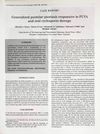 51 citations,
May 2011 in “Phytotherapy Research”
51 citations,
May 2011 in “Phytotherapy Research” Ginseng, especially red ginseng, may help regrow hair and block a hair loss-related enzyme.
 49 citations,
April 2012 in “Phytotherapy Research”
49 citations,
April 2012 in “Phytotherapy Research” Rosemary leaf extract may be an effective natural treatment for hair growth and male pattern baldness.
 39 citations,
December 2013 in “Phytotherapy Research”
39 citations,
December 2013 in “Phytotherapy Research” Safflower (Carthamus tinctorius) extract helps hair grow and could be used in hair products.
 31 citations,
January 2017 in “Phytotherapy Research”
31 citations,
January 2017 in “Phytotherapy Research” Ziziphus jujuba Mills may have health benefits, but more research is needed to confirm its safety and effectiveness.
27 citations,
April 2021 in “Phytotherapy Research” Curcumin may be an effective and safer anticancer agent by regulating key cell pathways.
 26 citations,
March 2015 in “Phytotherapy Research”
26 citations,
March 2015 in “Phytotherapy Research” Forsythiaside-A, a natural substance, can protect against hair loss and is more effective than current treatments, potentially making it a good option for hair loss treatment.
 25 citations,
November 2012 in “Phytotherapy Research”
25 citations,
November 2012 in “Phytotherapy Research” Crataegus pinnatifida extract may help increase hair growth and thickness in mice.
 23 citations,
November 2015 in “Phytotherapy Research”
23 citations,
November 2015 in “Phytotherapy Research” Certain herbal compounds, especially from bitter melon, can inhibit cancer growth and promote hair growth by blocking PAK1.
 3 citations,
March 2016 in “Phytotherapy Research”
3 citations,
March 2016 in “Phytotherapy Research” The new compound was more effective than finasteride in reducing markers of hair loss and prostate issues in cell tests.
 2 citations,
July 2023 in “Phytotherapy Research”
2 citations,
July 2023 in “Phytotherapy Research” Serenoa repens is mostly safe but has some risks, especially at high doses or when used with other products for over two weeks.
 2 citations,
November 2019 in “Phytotherapy Research”
2 citations,
November 2019 in “Phytotherapy Research” Pea sprout extract is safe and effectively reduces hair loss.
 2 citations,
March 2013 in “Phytotherapy Research”
2 citations,
March 2013 in “Phytotherapy Research” Ascorbigen increases hair cell growth in a lab setting but does not prevent hair loss from chemotherapy in mice.
90 citations,
July 2009 in “PTR. Phytotherapy research/Phytotherapy research” Spearmint tea may reduce testosterone and self-reported hair growth in women with PCOS.
32 citations,
February 2020 in “PTR. Phytotherapy research/Phytotherapy research” Rosemary extract may boost the immune system, but more research on humans is needed to confirm this.
26 citations,
June 2001 in “PTR. Phytotherapy research/Phytotherapy research” Procyanidin B-2 lotion might help men grow thicker hair without side effects.
23 citations,
March 2017 in “PTR. Phytotherapy research/Phytotherapy research” Butin is effective in treating vitiligo in mice.
20 citations,
December 2013 in “PTR. Phytotherapy research/Phytotherapy research” Ginsenoside Rg3 may help hair growth by increasing a growth-related protein in hair cells.
15 citations,
September 2012 in “PTR. Phytotherapy research/Phytotherapy research” Ginsenosides Rb₁ and Rd may help prevent hair loss by promoting hair cell growth.
 85 citations,
October 2012 in “Dermatologic Clinics”
85 citations,
October 2012 in “Dermatologic Clinics” Alopecia Areata is an autoimmune condition often starting before age 20, with varied treatment success and a need for personalized treatment plans.
 3 citations,
December 2021 in “Dermatology reports”
3 citations,
December 2021 in “Dermatology reports” Dupilumab can improve both atopic dermatitis and alopecia universalis.
 1 citations,
July 2020 in “Dermatology”
1 citations,
July 2020 in “Dermatology” Photobiomodulation helps reduce pain, lessen inflammation, heal wounds, and can be used in skin treatments. It also boosts hair growth in women with hair loss and may help fight microbes and prevent respiratory issues in COVID-19.
 182 citations,
December 2017 in “Journal of the American Academy of Dermatology”
182 citations,
December 2017 in “Journal of the American Academy of Dermatology” Some treatments can help with a hair loss condition called alopecia areata, but none ensure lasting results; choices depend on the person, with JAK inhibitors showing promise for severe cases.
 125 citations,
May 2019 in “Phytomedicine”
125 citations,
May 2019 in “Phytomedicine” Cepharanthine is a well-tolerated drug with multiple medical uses, including anti-inflammatory and anti-cancer properties.
 74 citations,
May 2016 in “Current opinion in pediatrics, with evaluated MEDLINE/Current opinion in pediatrics”
74 citations,
May 2016 in “Current opinion in pediatrics, with evaluated MEDLINE/Current opinion in pediatrics” Both vitiligo and alopecia areata involve an immune response triggered by stress and specific genes, with treatments targeting this pathway showing potential.
 71 citations,
March 2009 in “Seminars in cutaneous medicine and surgery”
71 citations,
March 2009 in “Seminars in cutaneous medicine and surgery” Alopecia areata can cause unpredictable hair loss, and treatments like corticosteroids and minoxidil may help but have varying side effects.
 53 citations,
January 2018 in “JAAD case reports”
53 citations,
January 2018 in “JAAD case reports” Dupilumab for eczema may cause hair loss.
 45 citations,
January 2020 in “International Journal of Molecular Sciences”
45 citations,
January 2020 in “International Journal of Molecular Sciences” Some natural compounds may help overcome drug resistance in certain cancers, but more research is needed.
 20 citations,
January 2000 in “Dermatologic Clinics”
20 citations,
January 2000 in “Dermatologic Clinics” New psoriasis treatments are effective but come with side effects and risks.
 18 citations,
December 2016 in “Phytomedicine”
18 citations,
December 2016 in “Phytomedicine” Curcuma aeruginosa essential oil effectively reduces hair growth and lightens underarm skin.
 15 citations,
November 1997 in “Australasian Journal of Dermatology”
15 citations,
November 1997 in “Australasian Journal of Dermatology” A combination of oral cyclosporin and PUVA treatment worked well for a severe skin condition called generalized pustular psoriasis.























